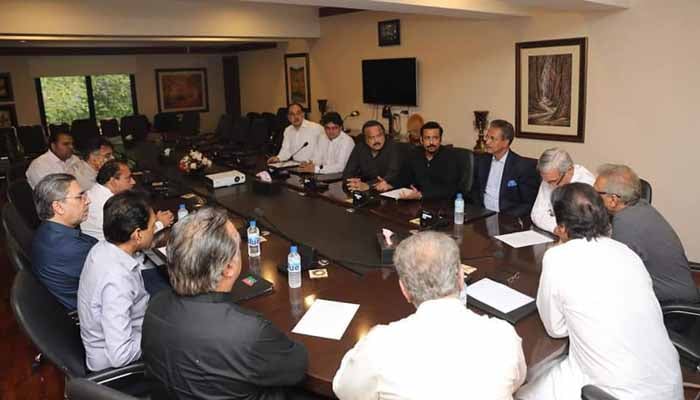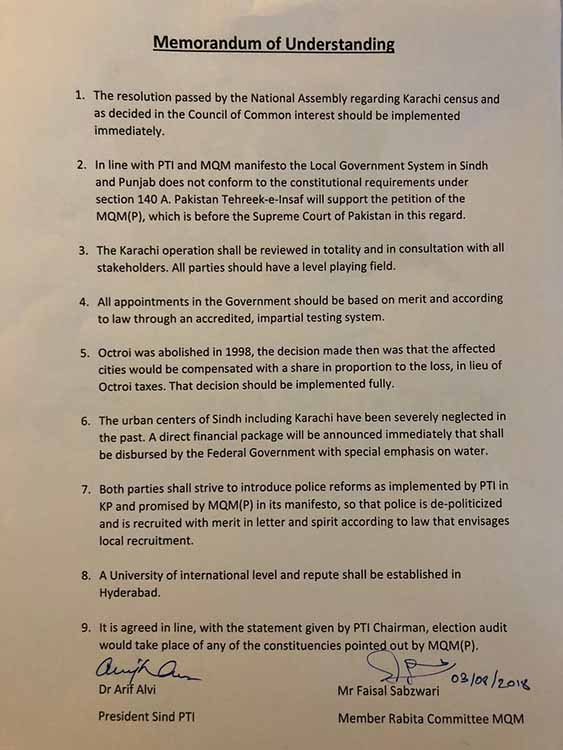Key points of PTI-MQM MoU non-implementable
The critical points of the Memorandum of Understanding (MoU) signed by the Pakistan Tehreek-e-Insaf (PTI) and Muttahidda Qaumi Movement-Pakistan (MQM-P) for election of Imran Khan as prime minister, are largely non-implementable.
ISLAMABAD: The critical points of the Memorandum of Understanding (MoU) signed by the Pakistan Tehreek-e-Insaf (PTI) and Muttahidda Qaumi Movement-Pakistan (MQM-P) for election of Imran Khan as prime minister, are largely non-implementable.
The reason is that the Sindh government, which is rival to PTI-MQM-P combine is not taken on board. It has nothing to do with the nine-point MoU as it is not a party to it. The agreement is not even a face-saver for the MQM-P and seems only an excuse to be associated with the future PTI government. Even otherwise, it is a strange memorandum because it is the PTI that has inflicted a heavy blow to the MQM-P by taking away majority seats in Karachi that used to be secured by the latter. Besides when the MQM alleges rigging it is directed at the PTI.
One point of the MOU demanded police reforms in Sindh as implemented by the PTI in Khyber Pakhtunkhwa (KP) so the force is de-politicised and recruitment is done on merit. It is a provincial subject and the federal government -- the two signatories of the MoU will be part of -- can’t compel the PPP government to what they have concurred. In an environment laden with tension, it is impossible that the Sindh government will listen to the federal authorities. Therefore, this clause is not enforceable in any way.
Another point provides for a review of the Karachi operation in totality in consultation with all stakeholders and a level playing field to all the parties. Such an evaluation may be done not to wrap up the drive that the MQM wants, but to further strengthen and reinforce it, which was started in September 2013 by the then Prime Minister Nawaz Sharif because it has produced credible results. None would allow the return of the nerve-shattering pre-operation mayhem.
Another point of the MoU calls for election audit of any constituencies pinpointed by the MQM as per Imran Khan’s statement. This is also impractical and unrealistic because the PTI would not permit loss of any seat it had won. It is a closed transaction. Besides, it is also not within the powers of the prime minister to order this kind of audit.
The PTI chairman’s statement apart, his lawyer has strongly opposed the vote count in NA-131 Lahore where Khawaja Saad Rafique is forcefully pressing. Audit may be held only if the PTI does not oppose it and when the MQM seeks it in a court of law. It doesn’t seem to be happening.
The population census is final and can’t be opened for review as demanded by the MQM. So, this point is also not implementable. Although the MQM has nothing to do with the local councils in Punjab, these local governments have also been bunched with the Sindh’s system with the call to conform them to the constitutional requirements. It may be PTI’s priority to wind up forthwith the local councils in Punjab dominated by its adversary, the Pakistan Muslim League-Nawaz (PML-N) - but not that of the MQM in any way because it has no say and relevance in the majority province.
Nobody may have any objection to another point of the MoU, which recommends appointments in the government based on merit and according to law through an accredited impartial testing system. However, the appointments in Sindh will be regulated by the PPP’s provincial government and not the federal administration. The previous central government had given a financial package for Karachi specifically to meet the water requirements of the biggest city. The incoming federal administration may build on it. Therefore, there is nothing new in yet another point of the MoU on the subject.
Similarly, no reservations will be expressed by any party if a university of international level is established in Hyderabad by the new federal government, as demanded in the MoU.
Another point calls for disbursement of losses caused by the abolition of Octroi (toll tax) in 1998. It was then decided that the affected cities would be compensated with a share in proportion to the losses in lieu of the Octroi taxes. The MoU stipulates immediate implementation of this decision.
-
 South Korea: Two Killed As Military Helicopter Crashes During Training
South Korea: Two Killed As Military Helicopter Crashes During Training -
 Elon Musk Unveils SpaceX’s Moon-first Strategy With ‘self Growing Lunar City’
Elon Musk Unveils SpaceX’s Moon-first Strategy With ‘self Growing Lunar City’ -
 Donald Trump Slams Bad Bunny's Super Bowl Performance: 'Absolutely Terrible'
Donald Trump Slams Bad Bunny's Super Bowl Performance: 'Absolutely Terrible' -
 Jake Paul Criticizes Bad Bunny's Super Bowl LX Halftime Show: 'Fake American'
Jake Paul Criticizes Bad Bunny's Super Bowl LX Halftime Show: 'Fake American' -
 Prince William Wants Uncle Andrew In Front Of Police: What To Expect Of Future King
Prince William Wants Uncle Andrew In Front Of Police: What To Expect Of Future King -
 Antioxidants Found To Be Protective Agents Against Cognitive Decline
Antioxidants Found To Be Protective Agents Against Cognitive Decline -
 Hong Kong Court Sentences Media Tycoon Jimmy Lai To 20-years: Full List Of Charges Explained
Hong Kong Court Sentences Media Tycoon Jimmy Lai To 20-years: Full List Of Charges Explained -
 Coffee Reduces Cancer Risk, Research Suggests
Coffee Reduces Cancer Risk, Research Suggests -
 Katie Price Defends Marriage To Lee Andrews After Receiving Multiple Warnings
Katie Price Defends Marriage To Lee Andrews After Receiving Multiple Warnings -
 Seahawks Super Bowl Victory Parade 2026: Schedule, Route & Seattle Celebration Plans
Seahawks Super Bowl Victory Parade 2026: Schedule, Route & Seattle Celebration Plans -
 Keto Diet Emerges As Key To Alzheimer's Cure
Keto Diet Emerges As Key To Alzheimer's Cure -
 Chris Brown Reacts To Bad Bunny's Super Bowl LX Halftime Performance
Chris Brown Reacts To Bad Bunny's Super Bowl LX Halftime Performance -
 Trump Passes Verdict On Bad Bunny’s Super Bowl Halftime Show
Trump Passes Verdict On Bad Bunny’s Super Bowl Halftime Show -
 Super Bowl 2026 Live: Seahawks Defeat Patriots 29-13 To Win Super Bowl LX
Super Bowl 2026 Live: Seahawks Defeat Patriots 29-13 To Win Super Bowl LX -
 Kim Kardashian And Lewis Hamilton Make First Public Appearance As A Couple At Super Bowl 2026
Kim Kardashian And Lewis Hamilton Make First Public Appearance As A Couple At Super Bowl 2026 -
 Romeo And Cruz Beckham Subtly Roast Brooklyn With New Family Tattoos
Romeo And Cruz Beckham Subtly Roast Brooklyn With New Family Tattoos





